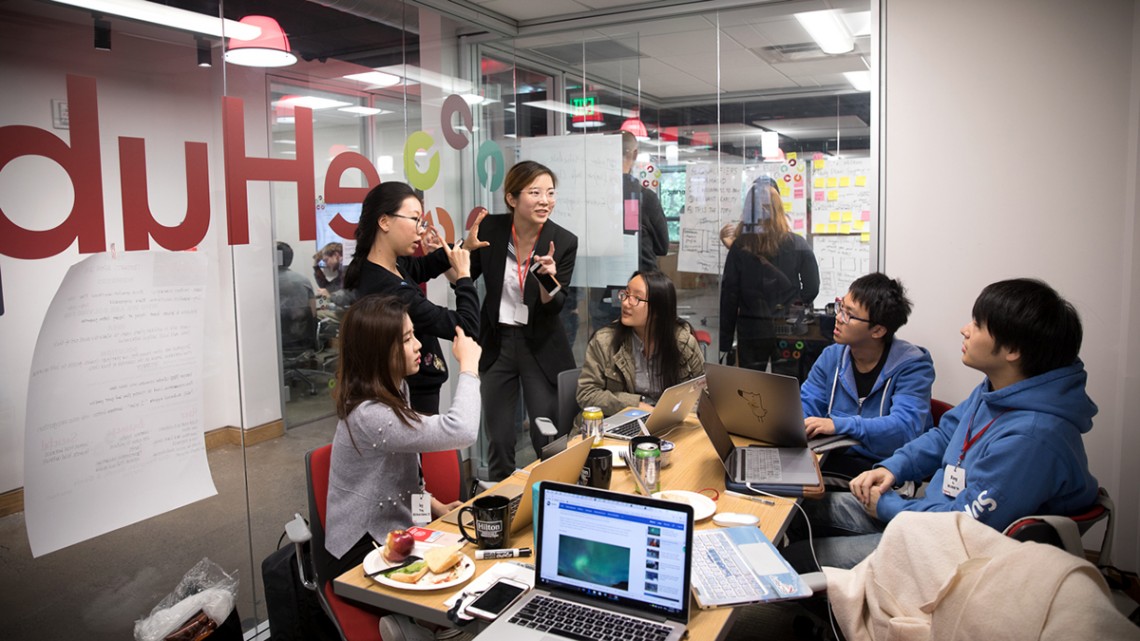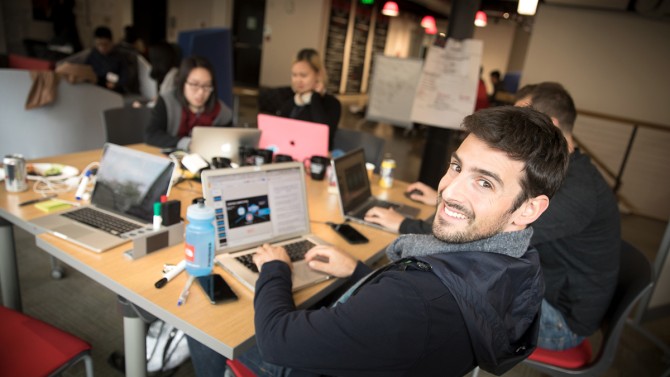
Students work in teams during the first hospitality hackathon, sponsored by Hilton, Sept. 30 at eHub Collegetown.
Students across colleges work together on hospitality hackathon
By Kathy Hovis
From sensors that help chefs automatically manage their inventory to apps that help housekeeping staff more efficiently clean their hotels, 115 Cornell students spent the weekend of Sept. 29-Oct. 1 coming up with ideas focused on the luxury hotel industry during a hospitality hackathon.
Hosted at eHub Collegetown by Entrepreneurship at Cornell, the event attracted graduate and undergraduate students from many Cornell schools and colleges, who formed diverse teams focused on personalizing guest experiences, creating a frictionless experience for guests and developing a data-driven product.
“This was the first in what will be a series of hackathons, and we’re thrilled that we could hold it at Cornell,” said Kerel Fryar, director of creative product innovation for Hilton, which employs many Cornell alums. “We know that tomorrow’s leaders are currently at colleges and universities across the country, and we feel their ideas are critical to solving some of the toughest challenges we’re faced with in the hospitality industry.”
The hackathon began Friday afternoon with Hilton leaders talking about the role of technology and innovation in the hospitality industry. Students then pitched their ideas and recruited team members before taking part in a design-thinking workshop (and staying up late to work on their ideas).
Saturday was filled with team meetings; technology presentations by Amazon, LG and Microsoft; team updates to the mentors (“pings”), where they sought feedback on their projects; lots of food and, again, little sleep. At noon on Sunday, 17 teams presented formal demos to an audience of judges and peers.
Chris Hooper, MBA ’18, was a member of the grand prize-winning team, Canopy Connects, which created an app to connect hotel guests with neighborhood hotspots and each other.
Building on the ideas of making connections and developing central meeting spots – already a part of Hilton’s Canopy branding – the business idea Hooper’s team developed connects people to attractions based on input from local hotel employees and visitors. Guests can also upload profiles and connect with other guests for shared experiences, said Amanda Cheng ’19, a student in Cornell’s School of Hotel Administration.
“I pitched a slightly different idea Friday night based on connectivity,” Hooper said. “Our idea went back and forth, but the fact that our team consisted of business students, hotel students, a developer and designer meant that we used all those disparate skills to come up with something that stayed connected to the Canopy brand.”
The five members of the team each won three-night stays at any Hilton property, along with bicycles and $1,500 to split between them.
“I was impressed by how each team balanced their skill sets and subject matter expertise,” Fryar said. “It was also a pleasure observing how many of the teams took advantage of the mentors throughout the event and quickly pivoted to refine their ideas based on feedback.”
Winning teams from each of the three focus areas also took home three-night stays at Hilton properties and $500 to split between team members. Those teams were:
- Data driven: Xenia, a platform that gives hotel managers real-time data visualization of predictions of guest behavior, such as arrival time, and sends messages to guests to foster organic interactions between them.
- Frictionless experience: H&E, which created an algorithm to help hotels manage housekeeping duties in more efficient and less cumbersome ways for guests.
- Personalized experience: Canopy Connects
“Every winning team was made up of students that had never done a hackathon before, and each team had a mix of majors – business, hotelies and engineers – a testament to how valuable diversity is,” said Ami Stuart, tech events manager for Entrepreneurship at Cornell.
Zoie Zhu ’18 and Bingxin Weng ’18 were members of Intellitory, which created a wireless mat to help restaurants manage their inventory and food waste. They created a prototype and demonstrated it during Sunday’s demo event.
“One reason I came was that I wanted to jump out of my major, information science, and find some applications in the real world,” Weng said.
The brainchild of Nathan Ladovsky, MMH ’18, the mat would provide real-time tracking of inventory, notify chefs when product supplies were low and automatically contact vendors. The mats could also be placed under garbage cans to measure food waste, which Ladovsky said is a $87 billion problem for the hotel and restaurant industry.
“I had this idea over the summer, but when the hackathon came up, I thought this would be an excellent opportunity,” Ladovsky said. “Together we were able to pivot our idea, realize a hardware component and build it out.”
On Friday Ladovsky started talking to Max Grayfer, MBA ’18. They knew they would need students with experience in mechanical engineering and user experience design.
“We realized we had this team with different skill sets,” Grayfer said; in the span of 36 hours they created a prototype.
“The best part of the weekend was working with people who are driven and like-minded and coming up with something in a very short period of time,” Ladovsky said. “It was a great work experience, looking at your own limitations and finding ways to work with others to expand them.”
Kathy Hovis is a writer for the College of Arts and Sciences.
Media Contact
Get Cornell news delivered right to your inbox.
Subscribe
